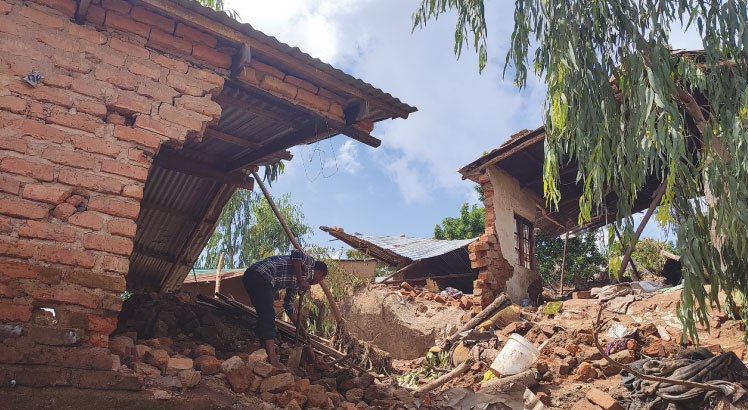Lilongwe River a time ticking bomb
Davie Mashalubu runs a ramshackle paying pit latrine on the bank of Lilongwe River near the bridge.
“I have a lot of customers. They include passers-by, shop owners, city dwellers and visitors,” says Mashalubu, seated under a mango tree outside the latrine.
Two water buckets are placed outside the toilet’s entrance; a toothbrush and toothpaste hang on wooden poles.
“They are for the customers. On average, three customers share one toothbrush,” he says.
And there is a bucket, just outside the latrine, containing water used by customers when brushing their teeth. He claims he gets the water from the tap. But a deep look into the water reveals muddy roots floating.
Asked on this he answers: “Sometimes I draw water from the river and treat it.”
Yet this is a river where hundreds takes a bath even in the daylight. Not only that. Further downstream, a number of enterprising men and women wash their wares.
As the river snakes under the Lilongwe Bridge, it passes by a busy Tsoka Flea Market. Women selling foodstuffs at this market dispose of waste in the river. Even drunks of opaque beer from the market are occasionally spotted urinating in the river. When crossing the bridge, the stench is bewildering.
Unarguably, the water from this river should be a ticking bomb. In fact, it threatens the lives not just of the 900 000 people in Lilongwe District but also those in Dowa and Salima.
Eliza Patel, who sells second-hand clothes at Tsoka Flea Market, complains: “We don’t have proper toilets here. Because of this, I have seen some disposing of sanitary pads in the river.”
National coordinator for Water Sanitation and Hygiene (Wash) Ngabaghila Chatata was startled by Patel’s revelation.
“The used pads are polluting the environment and are a health hazard to humans, especially when you factor in the issue of HIV/Aids,” she says
She warned that the river has a potential for disease outbreaks. “Being a market for vegetables, questions emerge as to how safe they are to the public buying them. The sanitation situation in the market centre needs to be addressed urgently with the leadership from the [city] authorities. We are sitting on a time bomb,” she says.
In August last year, Tamara Chafunya, public relations officer for the Lilongwe City Council said: “Currently, the Lilongwe City Council does not have the water quality standards equipment although it is also in the pipeline of being acquired. However we still continue with other precaution measure routines.”






This is very unfortunate.Sanitation is extremely important especially in our cities.It is my hope and prayer that the City Assembly will address this health hazard with utmost urgency.
wherw is the MP for the artea, this area has been like this for a long time. It should have a series of public toilets and poeplshould be stopped from using the river. It must be full of diseases but the sad thing is these tehn carry on runnnnning mpaka ku nyanja where the affluent go swimmingh!
Who is repsonsible why os this not picked up and sorted?